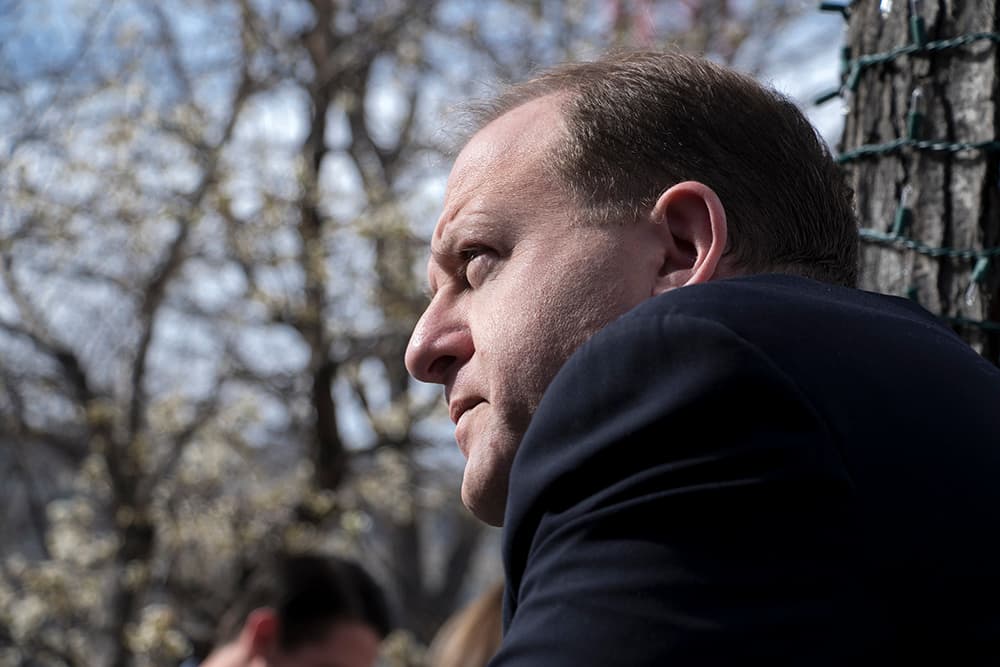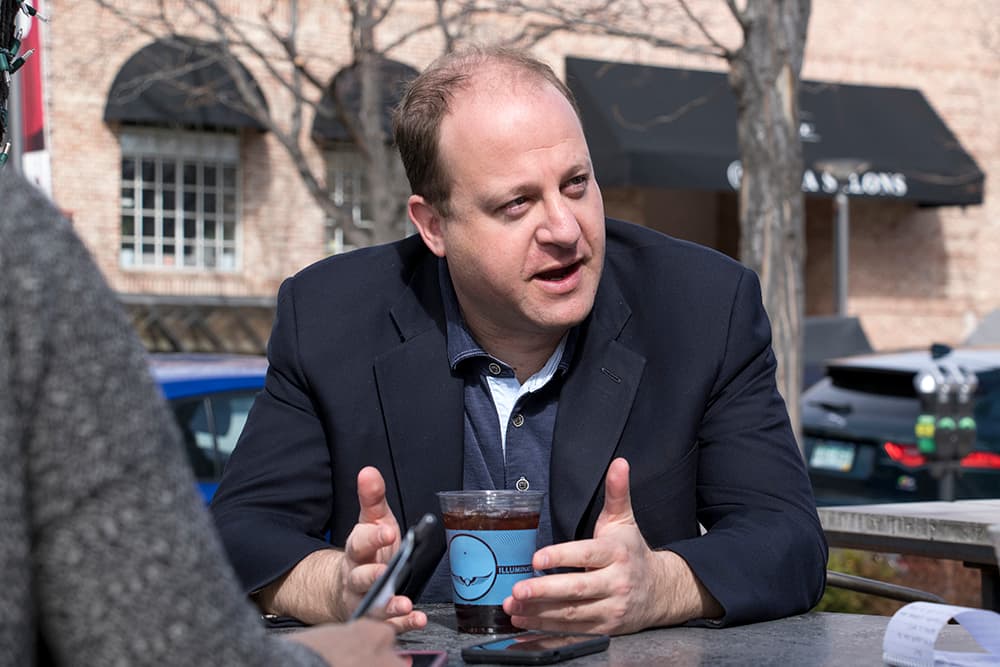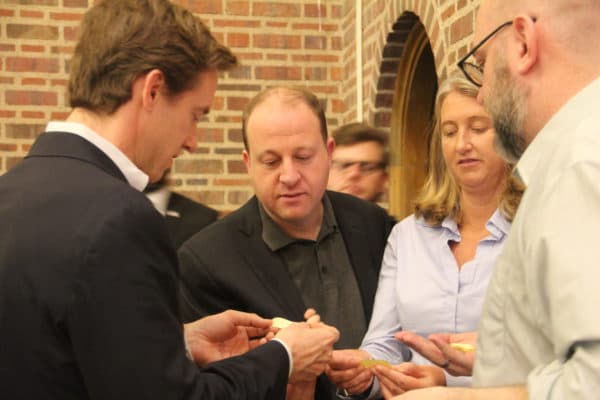
U.S. Rep. Jared Polis is trying to break through a crowded field of candidates in Colorado to become the country’s first elected openly-gay governor. He’s chasing history — like other candidates in the field — and doing so after already breaking barriers in Congress.
Though he’s running to be Colorado’s chief executive, the backdrop to his candidacy requires a national scope. After all, he’s trying to make history while President Trump is in the White House. Trump has eroded rights for LGBTQ communities, while Vice President Mike Pence has a history of supporting anti-gay legislation.
Polis, who called out Pence during a speech last month to Denver Democrats, recognizes the opportunities that affords him as a candidate.
“I think it really gives Colorado an opportunity to stick a thumb in the eye of Mike Pence, whose view of America is not as inclusive as where America is today,” he said.
Polis said his overall agenda, which includes environmentally focused ideas like getting the state to run on more renewable energy and keeping Colorado’s air clean, excites people. He also wants to launch universal preschool and kindergarten and increase access to healthcare.
“Colorado voters are more than ready for a bold, progressive vision for our state,” Polis said, adding later, “We have the opportunity to elect the first openly-gay governor, and at a time when LGBTQ Americans are under siege across our country, I think that sends a powerful message to President Trump and Vice President Pence.”
(Polis would be the second openly LGBTQ governor elected in the country, after Gov. Kate Brown of Oregon, who is openly bisexual.)
University of Denver political science professor Seth Masket said a candidate's sexual orientation may not be something that’s important to an average Colorado voter anymore.
“We know that people’s impression of the party is very important,” Masket said, though he added, “We haven’t seen him really tested outside his congressional district.”
Polis' perception among unaffiliated voters might be boosted by his stance against Trump. It’s an obvious platform for Democrats, but Masket said it could resonate with unaffiliated voters in Colorado because Trump is unpopular within the state.
“(Democrats) won’t disagree with him, but it’s something that they want to hear,” Masket said.
For now, Polis isn’t too worried about the Republican candidate he could end up facing if he earns the Democratic nomination.
“We’re focused on an inclusive vision in our state, and one that voters of all stripes can get behind,” Polis said. “I have many Republican supporters, many independent supporters, many Democratic supporters, and I find that there’s more that brings us together that keeps us apart in this state.”

Polis was largely considered the party favorite after announcing his candidacy. That's changing.
In Colorado, Polis still has some hurdles to clear. Former State Treasurer Cary Kennedy is challenging Polis as the party's gubernatorial frontrunner. Kennedy overwhelmingly won the statewide preference poll in March, beating Polis by roughly 17 points.
Neither candidate is on the primary ballot yet. Polis is the only Democrat taking both the assembly and petitioning route to appear in June's primary. His petitions are still pending verification. Mike Johnston is currently the only Democrat on the ballot.
Magellan Strategies, a Republican-leaning polling firm, conducted last month's poll showing Kennedy was narrowing Polis' lead. Magellan CEO and owner David Flaherty said their poll dispelled conventional wisdom that had more or less suggested Polis had already clinched the nomination.
"Everybody did think Jared had it in the bag," Flaherty said. "We showed that the horse isn't yet in the barn."
Flaherty said he hasn't conducted any polls specifically requesting information about a candidate's sexual orientation and whether or not it would effect a person's vote. He said that he thinks that among general election voters, those 55 and over might be more uncomfortable with same-sex marriages. People 50 and younger may be much more comfortable.
"It's more of an age thing than anything," Flaherty said.
Magellan's March poll showed that Democratic primary voters most care about addressing affordable healthcare, gun violence and public education.
A common knock on Polis is that he's too liberal to run a purple state. He thinks people are trying to say something else.
“I would say sometimes, I think political insiders might use that as a dog whistle to remind people that I’m gay, because I have a strong track record of working in a bipartisan way to get things done in our state and I would bring those skills to governorship, too,” Polis said.

Masket said it’s fair to call Polis a liberal, but he added that Polis is “hardly the most liberal member of the House.”
Switching support for key legislation and initiatives is one area where Polis has faced some criticism, as the Denver Post pointed out last month. Polis supported a ban on assault-style rifles this year after opposing such a ban five years ago. He also seemed to change his position on where drilling rigs could be located. His comments on the state's energy industry during an election forum also draw the ire of environmentalists.
“Of course we need to stand up to Big Oil and Gas, which I have always done, to protect the health and safety of Coloradans,” Polis told the Denver Post.
One way to strip away bias is by using numbers. Masket points to a program called DW-NOMINATE, which can rank House members based on their voting record. This scaling application offers a picture of where candidates fall on the political spectrum. The most recent DW-NOMINATE scores suggested Polis isn’t even the most liberal member of the Colorado delegation.
“In the 114th Congress (2015-16), Polis had an ideal point of -.285, placing him to the right of Ed Perlmutter (-.303) and Diana DeGette (-.437),” Masket said in an email. “This made him the 159th most liberal member of the House, which had 188 Democrats. The median Democrat had an ideal point of -.389 that year, so Polis was more moderate than most.”
The most liberal House member? That would be U.S. Rep. Barbara Lee, who represents Berkeley and Oakland.
Polis wants to ban “conversion therapy” in Colorado.
For him, it's a critical issue in the LGBTQ community, particularly for youth. A ban is currently being considered by the General Assembly.
A bill prohibiting licensed physicians from practicing “conversion therapy” on minors on Thursday passed the Colorado House and will head to the Senate, according to a release from House Democrats.
The release said “conversion therapy” has been shown to increase risk of drug and alcohol use, depression and suicide. A similar bill failed to pass in the Senate last year.
This “therapy” attempts to “cure” people and is rooted in the anti-LGBTQ view that sexual orientation is a choice and can be changed, according to GLAAD.
Out.com says it's already illegal in at least nine states.
“Still, in this day and age in Colorado, you know, parents can effectively have their own children kidnapped and taken to forced conversion facilities that have no basis in science, and we shouldn’t allow that,” Polis said. “It’s a form of child abuse.”
Inclusivity has been a hallmark of Polis' political career.
Polis said his work in public service has most often focused on inclusivity and equality. This includes protecting LGBTQ Americans from discrimination, but also ensuring children from all economic backgrounds get a good education through his efforts in Congress.
“Young people growing up in our state, across the country, should be able to look at their elected officials and say, ‘Yeah, they represent me,'" Polis said.
Sonya Jaquez Lewis has known Polis for 15 years. Lewis, the Democratic nominee seeking to replace state Rep. Mike Foote in House District 12, said she’s thrilled to see Polis running for governor. Lewis is also the former president of Boulder Pride.
“I like to call him a bold progressive,” Lewis said. “He’s always the leader in every issue. For instance, when it comes to LGBTQ rights, he stands up to Mike Pence, he stands up to homophobic statements at every turn.”
When they first met, Lewis said Polis started work to improve graduation rates among Latino students in his district and has “stuck his neck out” against oil and gas companies.
He was committed to supporting same-sex marriages (Polis is the first out parent in Congress) even before President Obama came out in support, Lewis said. The issue was ultimately settled in the Supreme Court.
“It took a awhile for Barack Obama to come on,” Lewis said. “We had Jared first calling for equal rights. He’s been calling for equal rights for LGBT for years. Truth to power is what I like to call it."
What's next:
Polis will participate in next Saturday's Democratic State Assembly, while still waiting for his petitions to be verified. That could happen within the next few weeks.
Before the assembly, Kennedy, Johnston and Lynne will participate in a gubernatorial debate hosted by 9News on Wednesday. The news station reported Polis will not be participating in the debate, which Polis' campaign said was due to a scheduling conflict.











